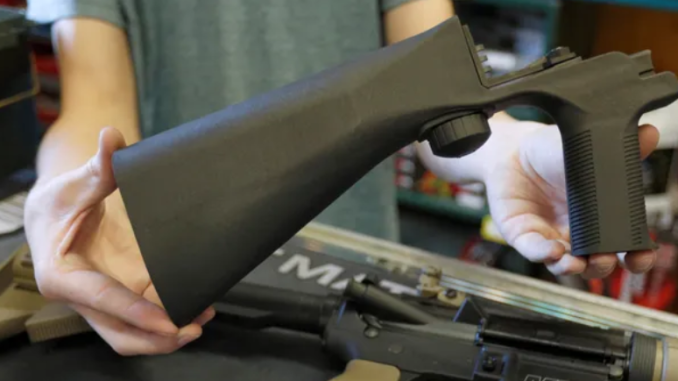
WASHINGTON – The Supreme Court on Friday said devices that turn a semi-automatic rifle into something closer to a machine gun are legal, a win for gun rights advocates and a blow to efforts to reduce gun violence that has besieged the nation.
The court split 6-3 along ideological lines in deciding that the federal government didn’t have the authority to classify a bump stock as a machine gun.
“A bump stock does not convert a semi-automatic rifle into a machinegun any more than a shooter with a lightning-fast trigger finger does,” Justice Clarence Thomas wrote in his opinion for the majority.
Justice Sonia Sotomayor, who read the liberals’ dissent from the bench, said the majority’s “artificially narrow definition” will have “deadly consequences.”
{snip}
But the Bureau of Alcohol, Tobacco, Firearms and Explosives’ 2018 conclusion that bump stocks meet the legal definition of a machine gun was a reversal from past decisions.
During the Supreme Court’s oral arguments in February, the conservative justices – many of whom have longstanding concerns about the regulatory power of federal agencies – were troubled about the carnage the devices can cause but also wondered if the Justice Department had too broadly interpreted a firearms law.
The hyper technical issue they were asked to resolve was whether a rifle with a bump stock fires more than one shot “automatically” and “by a single function of the trigger.”
The bump stock harnesses the recoil of the rifle to accelerate trigger pulls, technically “bumping” the trigger for each shot after it bounces off the shooter’s shoulder. A rifle can then fire between 400 and 800 rounds per minute.
{snip}
Michael Cargill, a gun shop owner and gun rights advocate from Austin, Texas, sued the government over the ban. The 5th U.S. Circuit Court of Appeals sided with Cargill and the Biden administration appealed.
In its decision, the appeals court said that the government was seeking to ban bump stocks “by administrative fiat,” even though the ATF had previously permitted the devices.
Congress banned automatic weapons for private use through a 1934 law, after machine guns became the weapon of choice for gangsters like Al Capone and John Dillinger.
Unlike another case before the court this year – whether domestic abusers can own guns – this one didn’t rest on the 2nd Amendment.
But it was still of high concern to gun rights advocates who pointed out that hundreds of thousands of Americans own bump stocks, relying on the government’s pre-2018 determinations that they are allowed.
{snip}
Likewise, the American Medical Association, whose members said they’ve seen first-hand the “enormous human carnage, destruction and chaos” caused by rapid-fire bullets, said firearms modified by bump stocks “have no place in a civilized society.”
The case is Garland v. Cargill.
(*) This article is somewhat biased against our 2nd. Amendment rights, but it does show that our voices are being heard!
* Original Article:
https://www.usatoday.com/story/news/politics/2024/06/14/supreme-court-trump-bump-stocks-guns-decision/72957521007/


